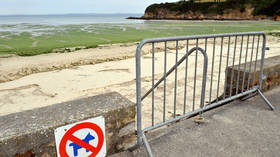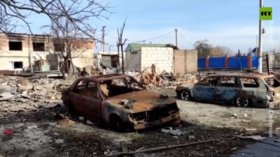‘Killer slime’: Highly toxic algae invades France’s picturesque beaches

The postcard-perfect coastline of Brittany, France is being ravaged by highly toxic algae, which emits gas that can kill a human in seconds. The deadly phenomenon has already forced the closure of several beaches.
A popular destination for tourists, Brittany has struggled in recent years to stop the encroachment of lethal green algae on its shoreline. Dubbed ‘killer slime’ by locals, the toxic seaweed has been linked to nitrates in fertilizers and waste from the region’s agriculture industry. When the algae decomposes, pockets of toxic gas form under its crust.
One wrong step could “kill you in seconds,” according to a local resident who spoke with the Guardian. The newspaper reported that the man uses a gas mask when traversing areas near the deadly seaweed.
Also on rt.com Sweaty and proud: Why Europe doesn’t cool itself off with air conditioningThis summer, Brittany shut down six of its beaches overrun by the green slime. A facility used to store and dispose of the algae also briefly suspended operations due to an unbearable odor.
Fatalities from the deadly sludge have already been reported. In 2016, a jogger died after apparently coming in contact with the poisonous gas. His family sued the state and local authorities for not doing enough to warn the public about the dangerous algae.
Activists have demanded government action, accusing authorities of ignoring the issue altogether.
Inès Léraud, a French journalist who investigated the phenomenon, said that the public health hazard has been met with a “wall of silence.” She also theorized that many of the people who were killed by rising tides or currents each year in Brittany may have been first knocked unconscious by toxic gas.
Also on rt.com 1,500 died in record heatwave in France – ministerLike this story? Share it with a friend!














